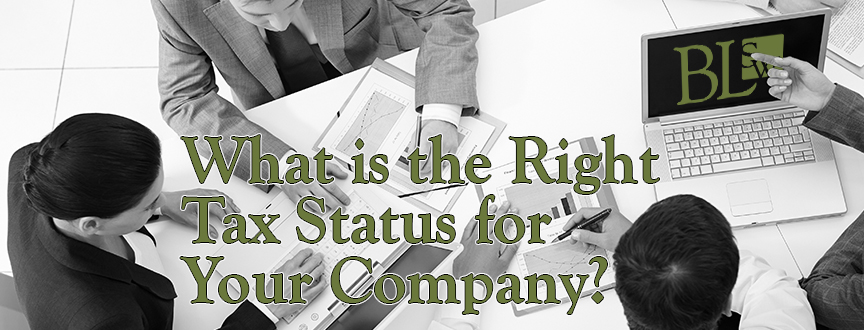When confronted with this question, I usually respond with, “Please ask that question to your CPA or Accountant.” After all, a good CPA or Accountant, who understands the needs of your business, is going to be able to make a good recommendation and help you minimize your tax exposure (legally). Read more in this article, Accountants vs. Lawyers: Using the Right Tools for the Job.
If you don’t have access to a CPA or Accountant (and I strongly recommend you form such a relationship, if you’re a business leader), be careful what you read on the Internet — much of the information on the Internet is either wrong or grossly simplified to the point of being unhelpful or misleading.
The following chart can help you understand what might be the best tax status for your company. There is no one “best tax status”. It really depends on who owns the company, and how you want to deal with allocations and distributions of profits and losses.
For example, S-Corp is a popular tax status, as it can provide savings on “self-employment taxes” (after involved owners are paid a “reasonable salary,” so such savings don’t kick in until the company is making a decent profit). However, S-Corps are limited by the number of owners and who can own the company. Also, S-Corps require profits and losses to be allocated and distributed exactly according to pro rata to ownership (versus paying profits to one owner greater than his or her pro rata ownership). Because of all the requirements associated with maintaining “S-Corp tax status,” it’s easy to make mistakes and lose the tax status. When that happens, it can be very expensive, because your tax status then reverts to C-Corporation versus Partnership.
Review the chart to help determine what might be the best tax status for your Company, and then please confirm with a good CPA or Accountant. Mouseover the footnotes to learn more.
| Disregarded | Partnership | S-Corp | C-Corp | Liability Protection for Owners |
|---|---|---|---|---|
| Can own property | ||||
| Needs a separate tax return (1) | ||||
| Considered a “Pass-Through Entity” (1) | ||||
| Can be owned by individuals | ||||
| Can be owned by other entities | (2) | |||
| Can be owned by non-citizens | (2) | |||
| Restrictions on who can own the entity | (3) | (2) | ||
| Can have more than one owner | (3) | |||
| Owners have multiple types of ownership interests/classes of stock | ||||
| Owners can be employees of the business (5) | ||||
| Separately pays corporate taxes | ||||
| Owners customize how to allocate profits and losses (4) | N/A | |||
| Owners can save up to 15.2% by not paying self-employement taxes (6) | ||||
| Owners take “draws” from business earnings | ||||
| Owners take “distributions” from business earnings | ||||
| Owners take “dividends” from business earnings | ||||
| Subjects the owners to “double-taxation” (7) |
The Footnotes
( 1 ) A separate tax return is required at the Federal level and those states that tax companies, although pass-through entities means the profits and losses are reported at the owner level and even so, a partnership return must be filed, even though taxes are not technically paid at the company level for pass-through entities.Back to top
( 2 ) S-Corps cannot be owned by non-resident aliens and cannot have more than 100 shareholders. Can only be owned by certain natural persons, trusts, and disregarded entities.
Back to top
( 3 ) Disregarded entities can only have one owner, although if it has two owners that are married to one another in a community property state, then it is considered as “one owner” by the IRS.
Back to top
( 4 ) Profits and losses can be allocated and distributed at percentage levels that are different from ownership percentages. Partnerships are the only tax type that permits this. All other tax types require allocations and distributions of profits and losses to be exactly the same as the ownership levels.
Back to top
( 5 ) This doesn’t mean owners cannot work for companies taxed as partnerships, it just refers to how the owners are classified for tax purposes.
Back to top
( 6 ) It’s important to consult with a tax advisor. The savings on self-employment taxes can be substantial, but it does depend on how owners are paid and the income levels of the company.
Back to top
( 7 ) The company is taxed on its profits. Then, it distributes those profits to its owners via dividends, and the dividend income is taxed on an individual basis on the owners personal income taxes.
Back to top
Ready to speak to a Tax Attorney?
Give us a call at 505.848.8581
Business Law Southwest.
Business Law That Makes Business Sense.
A Slingshot company.






